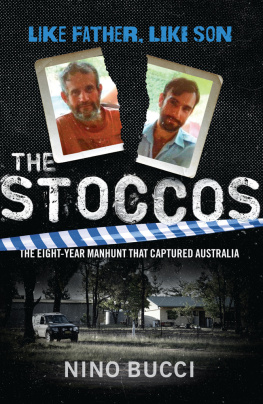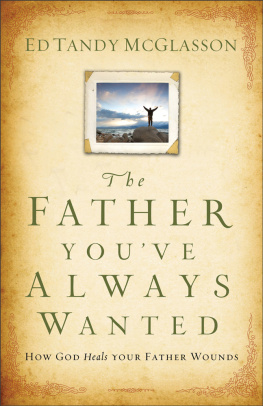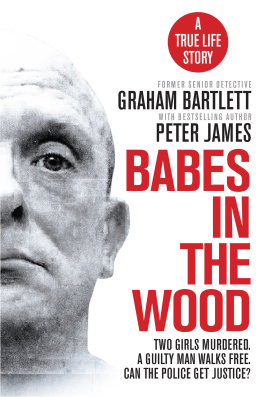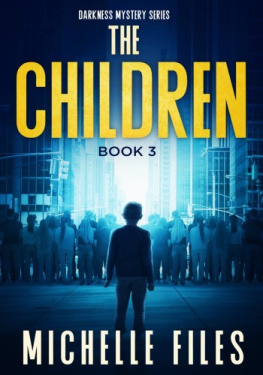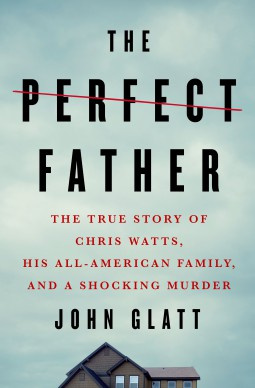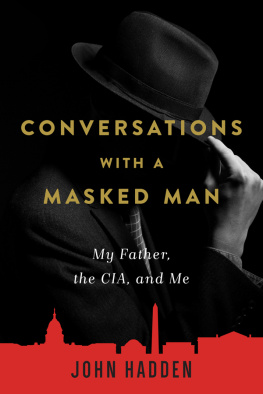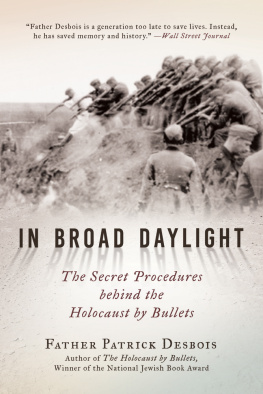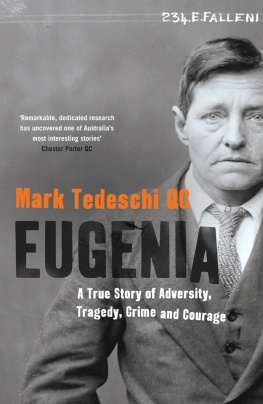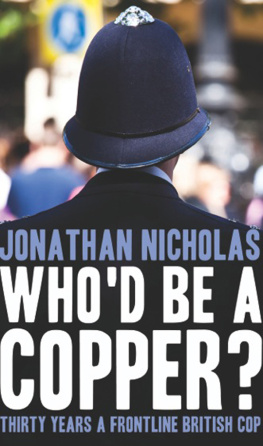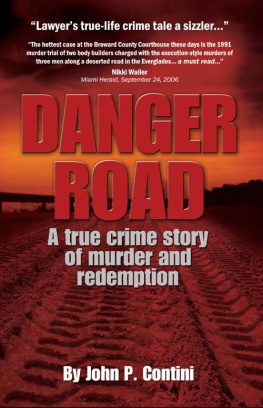For trusting me to write this book, and being unfailingly generous while I did so, I wish to thank (in no particular order): Ian Durkin, Doug Redding, Graham and Peg, Dave Barron, Mick Wolfe, Darren Cloake, Liam Duffy, Matt Shaw, Fiona Duncan, Luke Tidswell, Peter Farley, Rick Nugent, Paul OHalloran, Virginia Gorman, Mick Banfield, and the countless others who spoke to me but did not wish to be named, including victims or relatives of the Stoccos, those who had known them, and police. Thanks also to the wider Queensland, Victoria and New South Wales police forces for their assistance.
My former colleagues at The Age , where I worked while writing this book, were patient, encouraging, and offered guidance. Thanks especially to Chris Johnston, Tammy Mills, Cameron Houston and Tom Cowie. Thanks also to other journalists across Fairfax Media who assisted with the book, particularly at the Sydney Morning Herald .
At Penguin Random House, thanks to Cate Blake, Amanda Martin and Kevin OBrien for all your work.
For teaching me the importance of words, I thank my mother and father. For being the first person I properly shared them with, I thank my brother. And for supporting me to keep trying to find them, and picking up everything else while I do, I thank my wife.
The highways are long and straight and grey. Like the barrel of a rifle. Five of them meet at St George, in western Queensland. Every now and again, something catches the sun and starts to glint. A minute or so later, a road train bangs past; forty-odd metres of steel and rubber and glass. And then you are alone again with the road, and the carcasses of roos and pigs and tyres. Beyond them are the farms; cotton and wheat mostly, some cattle.
Cubbie Station, about an hour south of St George, is the most famous farm of them all. It has the largest irrigation system in the southern hemisphere, with a 28-kilometre-long reservoir that could store all the water in Sydney Harbour and that reaches every corner of the 93 000-hectare property. Much of the water was in the Balonne River before it was sucked up.
The Balonne, wide and brown, with dead gums poking their limbs up from its middle like distressed swimmers signalling for help, runs parallel to St Georges main street. St George is a town intimate with both drought and flood; a town with a verandahed pub, a water tower wearing a crown of mobile-phone antennas, and a carved emu egg museum with a $5 entry fee. Almost anywhere else it would be a small town, but in this patch of Australia, just where the deep green of the eastern seaboard starts to turn red, it is a regional centre, with council headquarters, and a post office and banks.
It is the sort of town you can imagine a person like Barnaby Joyce living in and he did, for a decade, working as a local accountant at his firm Barnaby Joyce and Co. before he became a senator. In 2013, he quit the Senate and left St George, moving to Tamworth to run for a House of Representatives seat in New England. It was a bold play, leaving St George, and a smart one. Less than three years later, he was deputy prime minister and the leader of the National Party.
St George is a farming town and a frontier town. Surveyor Thomas Mitchell came through the region while trying to find a route from Sydney to the Gulf of Carpentaria in the 1840s. When he returned to Sydney two years later, word spread of the unclaimed pastures almost 900 kilometres north. What followed was years of conflict between squatters and the local Indigenous population, the Mandandanji, who attacked every station in the region until their resistance was bloodily and mercilessly crushed. Almost all that was left of them was a river bearing the Mandandanji word for water, or running stream: Balonne. Thats what Mitchell thought he heard, anyway, when it came to giving it a name.
If youre a cop in St George, its those passing through, not those on farms, who cause the trouble. Most are cutting inland as they drive northsouth, or southnorth, as Mitchell did more than 170 years ago. Others drift from central Australia towards the east coast, or in the opposite direction. Some of those rolling through St George are moving something they shouldnt: drugs, mostly. For others, it is the movement itself that is the trouble: the vagrants or backpackers who will not be here long enough to be caught. They shoplift. And then theres the other source of trouble: those who cannot move. Those who are stuck here. Who have a lash at the bottle, or the glass pipe, or the bong, or the needle or all four before lashing out at each other.
On the afternoon of 14 June 2013, the local sergeant, Liam Duffy, got a phone call from Kim, the owner of the FoodWorks in town. Duffy had given his personal number to most St George business owners and told them to use it any time. He knew that if they had to report crime by coming into the station, or by waiting for someone to pick up the landline, then the crime would rarely be solved; whoever was responsible would be back on a highway and gone. Kim had just confronted a shoplifter, who simply ignored her and walked out. The supermarket was only 150 metres from the police station, so she called Duffy. He had spent the morning doing first-aid training, and had taken a break for lunch. Because of the training, there were more coppers rostered in the town that day than normal. They had come from tiny stations all across southwest Queensland to be trained. It was impractical for them to wear their utility belts, with handcuffs, pepper spray and handguns, during the training, but they were in uniform. The other officers had left the station for lunch when Kim called.
Duffy listened to her describe the man: he wasnt a local, looked like a backpacker unkempt, bearded, dark features, probably early thirties and he was walking towards the river. That meant he was walking towards the police station. Duffy walked out the back of the station and saw a bloke who looked exactly like the man Kim had described. He had bulging pockets and bulging eyes, which kept flicking over his shoulder towards the supermarket to check if he was being followed. Duffy told Kim he saw the suspect, and hung up the phone. His soft face, quick to smile, hardened as he bellowed, Stop, police! and his thick arms and thicker legs started to pump, propelling his 100-kilogram and 190-centimetre frame towards the suspect.
Gino and Mark Stocco called it going shopping. The father and son walked into a shop, took what they wanted, and left without paying. They would go shopping for groceries. They would go shopping for farm machinery. They would go shopping for camping gear. Until they shopped too much in North Queensland and decided to leave their home town of Ingham. That was a dozen years, a couple of prison stints, a yachting adventure and tens of thousands of kilometres ago. They did not miss Ingham, and its whispers and its memories. The road was home now.
The Stoccos drove along a highway lined with tufts of cotton and dying weeds stuck in the red dirt, arriving in St George: a town with two supermarkets to shop in, and five highways to choose from after they did, so they could be on their way again.
The pair decided on the FoodWorks. It was smaller, likely to have fewer staff and customers, and was slightly closer to the edge of town. It was also on an intersection, so the pair could walk separate ways after shopping. Gino would do a lap of the block and go and fetch their ute, and then pick Mark up near the Balonne River.
The white automatic doors slid open and they strode inside. The supermarket was small, with only a few aisles down the middle, a deli along the right side, fridges and freezers along the left, and a fresh produce section at the rear. The pair separated, filling their pockets as they went. There were cameras in the store, but the Stoccos werent bothered. Stealing came naturally to Gino. He had been doing it for most of his life. And, gradually, he had helped his son understand the importance of theft. It was not merely a means of survival: without taking back what was rightfully theirs, there was no way to even out the system, and the world would remain unjust.

